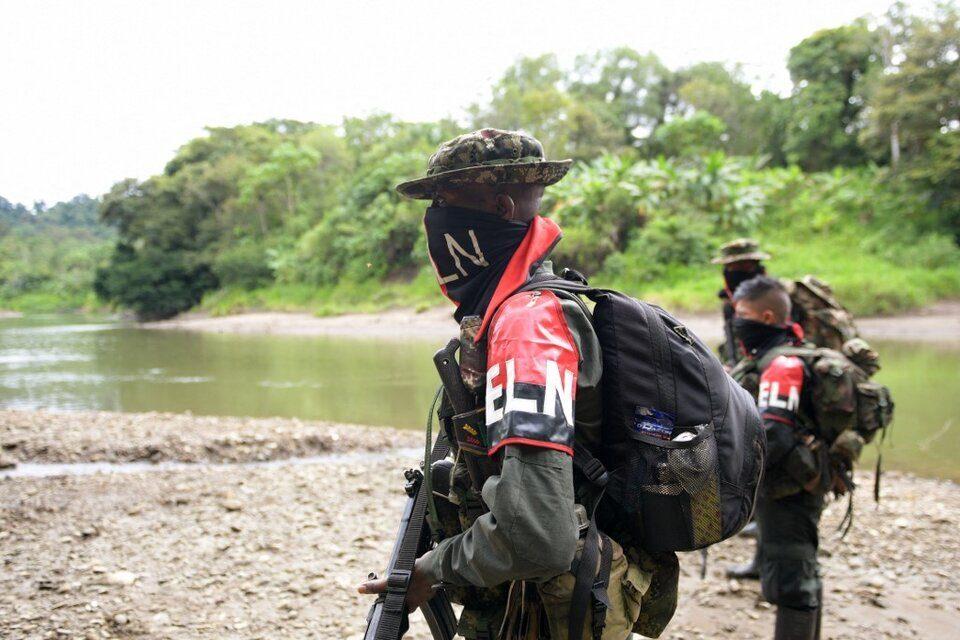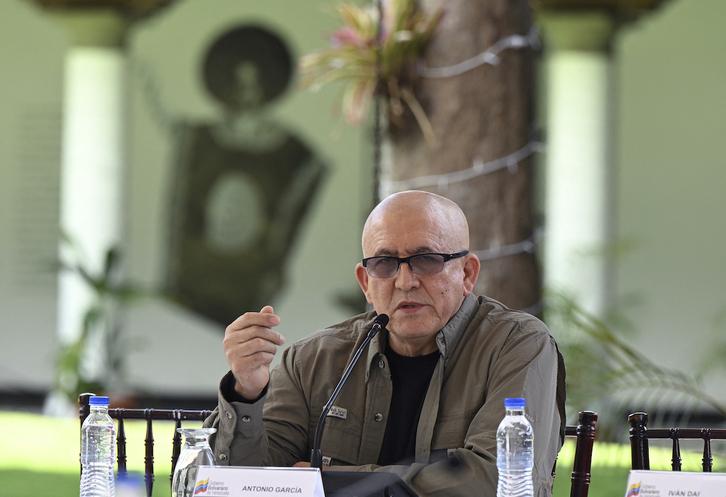
In response to a questionnaire sent by GARA before the Arauca attack, the first commander of the ELN, Antonio García, stresses that they do not consider the process broken: “We consider it frozen and waiting for solutions.” The guerrillas have announced that they are going to meet with the government delegation.

The process of talks with the government has been frozen since May. What measures or actions could lead to a resumption of talks?
The causes of the freezing of the talks are the government’s failure to comply with agreements. It is not possible to return to the table if this error is not rectified in practice, which is why the ELN continues to expect the government to comply. There is no point in continuing to talk if what is agreed is not fulfilled.
You accuse the government of “continuing to haggle”. At what points do you consider that you are “haggling”?
The attitude of all governments in Colombia is one of bargaining. I do not mean that points of view are not defended, or proposals are presented; but another thing is bargaining, the permanent insistence that it should be the other party who always gives in, who ‘lowers the price’.
In the Roundtable it is the insistence on this trend and little feeling for joint construction. Governments would like the insurgency to put the noose around its own neck.
At this point in life they continue to consider that the insurgency must accept their laws and their Justice; if it were so, we would be facing an imposition and if that happened we would be giving in. As that is their aspiration, it is logical that they will always haggle.
In an interview with NAIZ, Gloria Cuartas, director of the Implementation Unit of the Final Agreement signed between the FARC-EP and the government of Juan Manuel Santos in 2016, encouraged “the ELN, the dissidents, the trade union movement, the victims, the social organizations… to surround total peace.” How do you accept this call?
In the ELN we have not shared the negotiation of the ex-FARC, because they deludedly tried to negotiate the armed uprising, as if they were the only ones who took up arms and they wanted us all to take that wrong route, because they did not manage to attack the overcoming of the causes that originated the armed uprising, they focused on its legalization, the other agreements were marginal and short in their application and compliance.
They were in a lot of haste, they started first to set the tone for us, we looked for them to work on a unified peace process, but they were already in a lot of haste and they ended up in what has been the disorder that we see.
Cuartas also warned that “the Colombian ultra-right seeks the failure of Gustavo Petro. If it happens, we all fail.”
Today the hegemonic sector in the Colombian political regime is not the extreme right, but ‘Santismo’, which is right and presents itself as center-right, sharing the essentials with the extreme right: neoliberalism, dependence on the United States, social exclusion, political persecution.
He differs in that he tries to govern with other political forces and does so with a little more respect for the institutionality, a matter that gives him ‘margin of governability’; at times and in a cyclical manner, Petro governs in coalition with them.
In what scenario would you place Colombia, the social and popular organizations, and the ELN, in particular, in the face of a possible return of the right to the government?
It is not that the right is ‘going to return’ to govern, but that it must be understood that it is present in the regime and in the powers of the State, and if you do not have the social and political strength it is an illusion to think that you are going to govern from the left, especially if you do not have majorities in the Legislative Power because any attempt at reform is stopped.
The ELN made it a condition that the guerrillas be removed from the GAO list in order to prolong the cessation of hostilities that was in force for a year. It set a waiting period of August 23 for the presidential decree withdrawing the guerrillas to be made public. This has not happened. Do you think it can still happen?
That does not depend on the ELN or what I consider. In politics, beliefs don’t work. What the government has done so far is to change the names for the different groups, whether they are rebels who have taken up arms, gangs or paramilitaries, which does not solve the problem, since it does so with the focus on the ELN accepting its law or its justice. And that is not the way.
Do you see it feasible to resume the cessation of hostilities?
The reality today is that the government did not value the extension or prolongation that the ELN made of the ceasefire to seek solutions, and continued with its game.
Now we are without a ceasefire, the concrete thing is that we continue with a desire for peace, we are not breaking with the process, we consider it frozen and waiting for solutions. At other times we have dialogued in the midst of confrontation.
Undoubtedly, all of us, the government and the ELN, have taken a step back, but the ELN is always open to continue looking for solutions, although we hope that the government complies with what has been agreed.
What message would you convey to Colombian society and to the guarantor countries in the face of the freezing of the process?
The ELN continues in the search for a political solution, which is not submission or imposition, and aspires to have a counterpart in the government that complies with agreements.
President Gustavo Petro has already completed half of his term. Is time pressing?
He has less than half of his time in government left, he has wasted it, he has allowed himself to be tempted by the wrong paths. But it is not the ELN or I who are the ones to make assessments that correspond only to him.
In its editorial “Total Peace: New Name, Old Doctrine,” the Central Command maintains that “the total peace drawn up by the progressive government only changes the title of the Security Doctrine” and affirms that it “serves the continued genocide of the popular leadership.” What is your assessment of the policy of “total peace”?
It was a bad step that tried to put all the groups in arms in the same sack, without much distinction, a serious mistake. At the beginning he told us that he was clear, that he knew that the ‘ELN was different’, but in the course of the process he opened the sack more than necessary, even disrespecting the dignity and integrity of the ELN and its Command.
If your enemy does not value or respect you, you will never be able to agree with him.
The policy of ‘total peace’ has been evaporating, because it does not have serious results, it is a kind of ‘hotbed’ for gangs and bandits, in recurrent crises.
On the other hand, it is essentially wrong to pretend that a society does not have conflicts, since what every government must do is to know how to deal with such conflicts; conflicts are always the immune system of societies that seek to solve the problems that arise in them.
The ELN has turned 60 years old. What is your assessment and what challenges do you face?
On the continent, other ways other than the armed one have been only momentary and have not been able to sustain themselves in a stable way in several countries and there is a relapse into clientelist governments or the return of the old right-wingers.
Maintaining ourselves as the only revolutionary guerrilla on the continent is a responsibility because we are obliged to mark truer routes than those that progressivism has presented so far, with little stability in the changes that our societies require.
The annihilation of the ELN was set to occur due to a military defeat in 2018, in the middle of the Duque government, but we are still following after 6 years, that means that the State and its political regime have such a purpose, therefore the path of a political solution is elusive and it will be a complex battle, but we will continue to persist in it, but without naivety.
Source: Resumen Latinoamericano